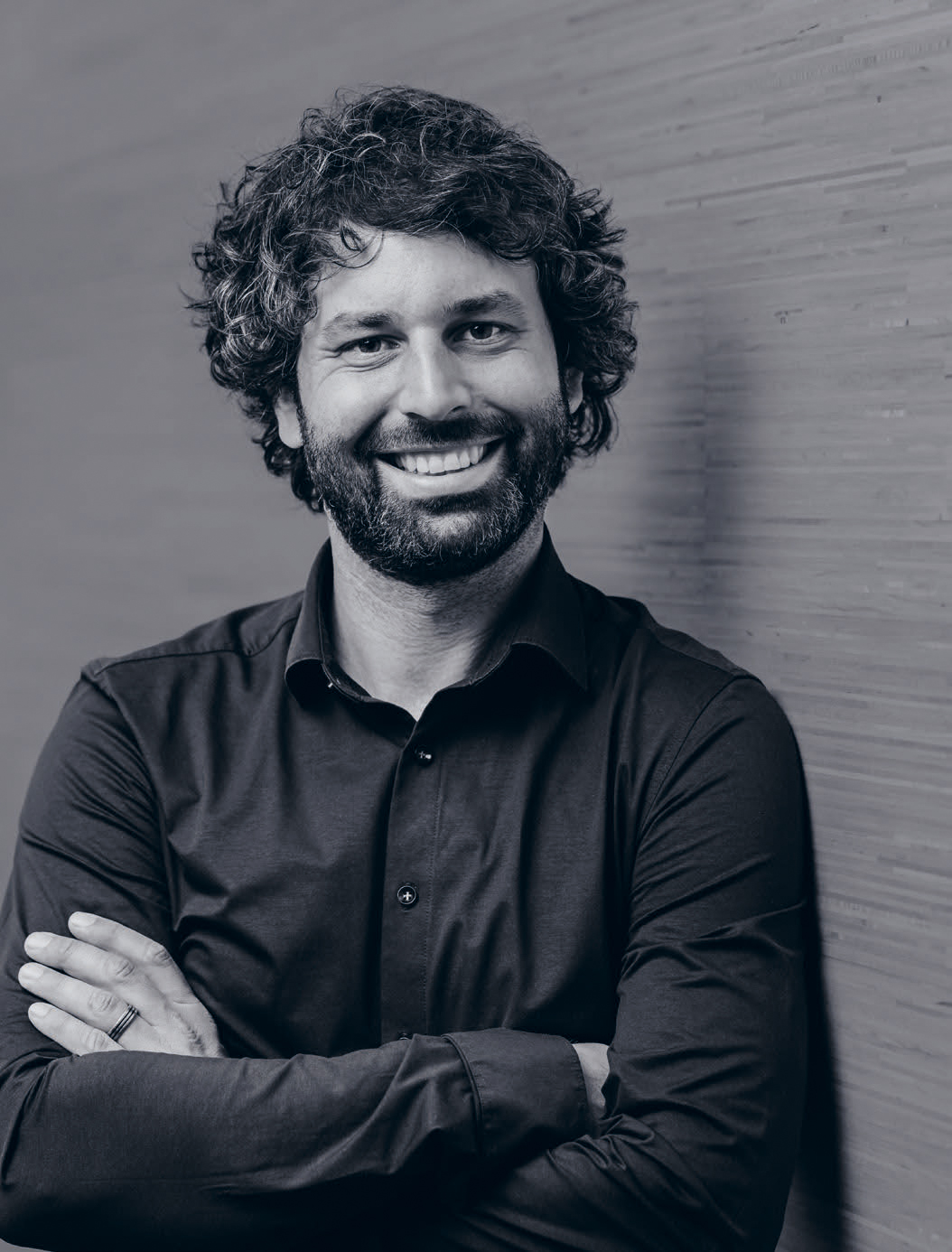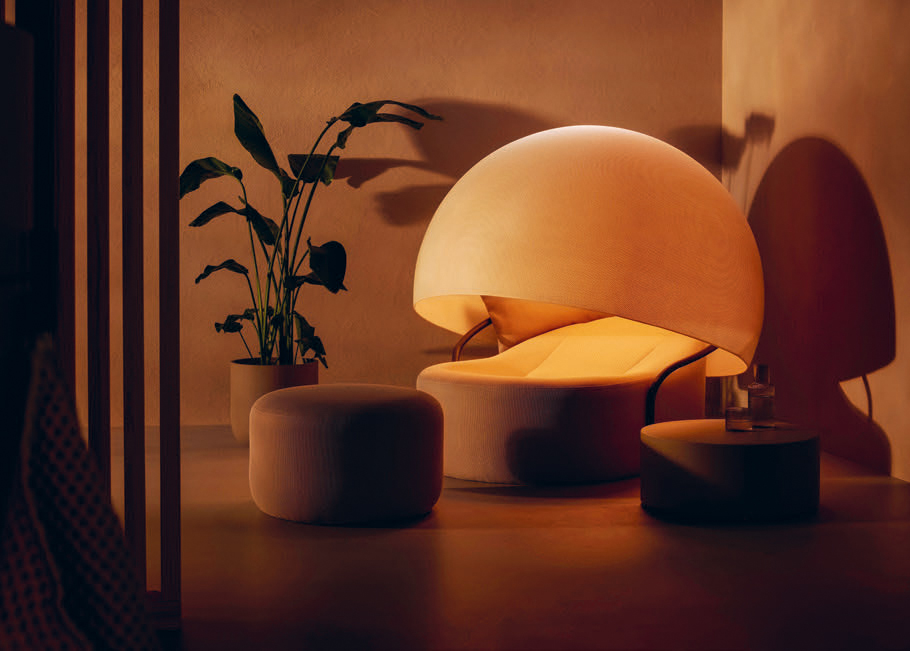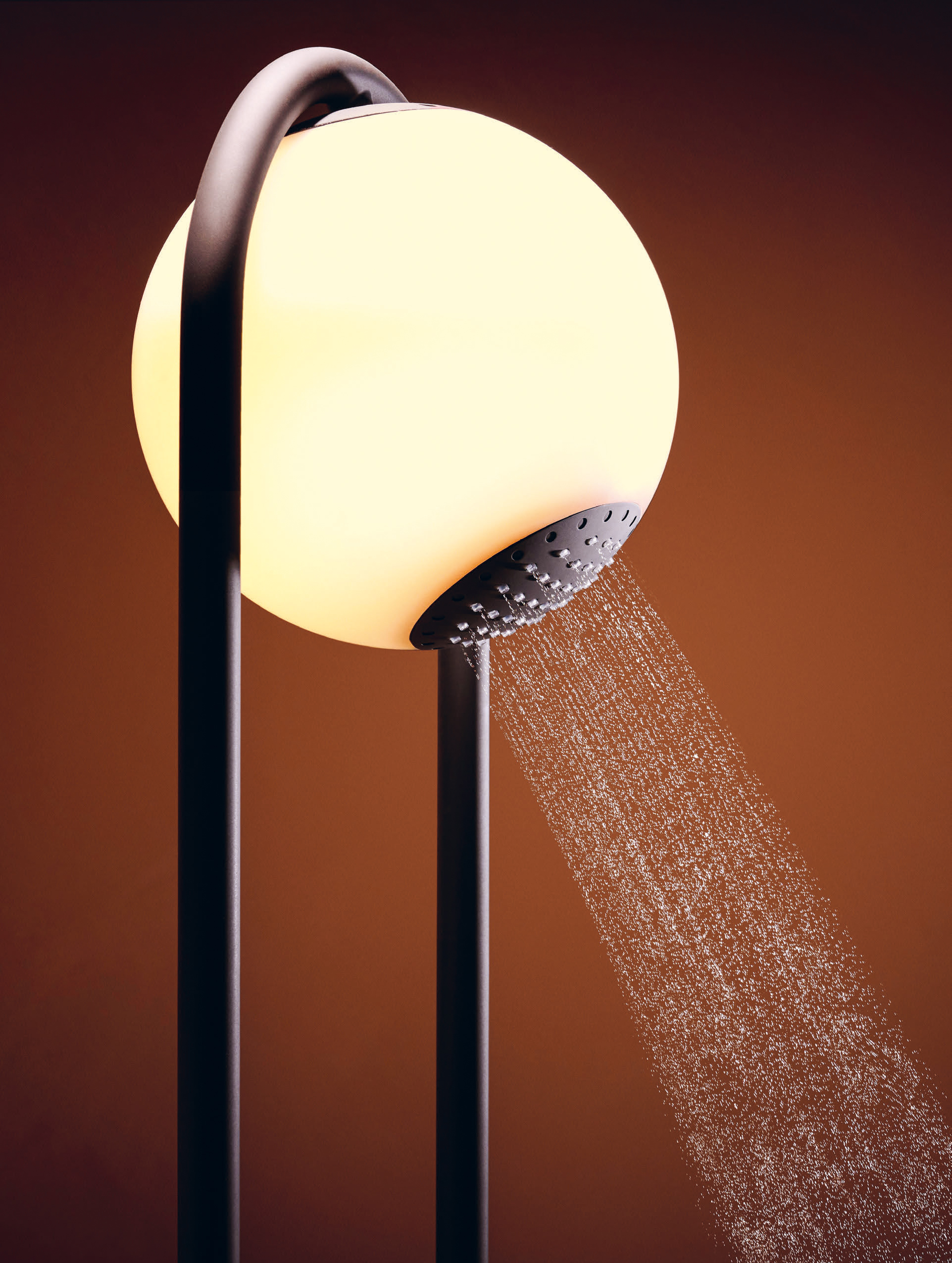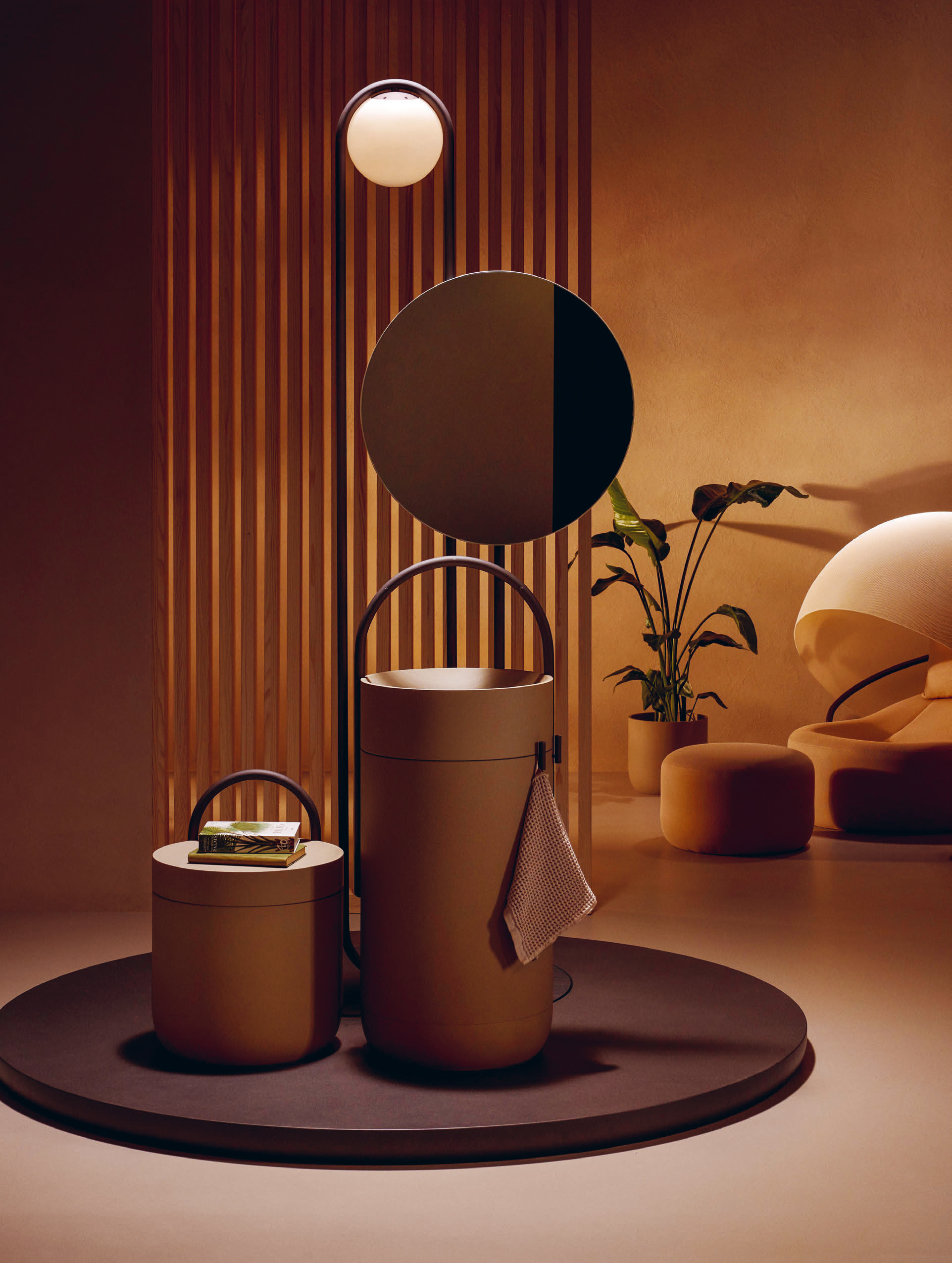This is the decade
of decisions!
Steffen Erath
Shower and tap manufacturer Hansgrohe is striking out along radical new paths; the company’s Green Vision Beyond Water concept suggests a 90 per cent reduction in water consumption. What’s behind it? And will we ever be allowed to take a bath again? We talked to Steffen Erath, Head of Innovation & Sustainability at Hansgrohe.


Water is probably the most valuable resource in the world. We should use it carefully. With this in mind, Hansgrohe is seeking to reinvent the bathroom.

1
An imaginative solution: an illuminated ball
shows how long the water for showering will last.
It symbolically expresses the value of water.
At the recent ISH, the world’s leading HVAC and water trade show, you unveiled complete bathrooms and bathroom concepts—but you also cut to the chase with your clear-cut Green Vision concept: 90 per cent less water consumption, 90 per cent less energy consumption, and 90 per cent lower carbon emissions are all possible. For example, a shower head with LED lights that indicates water usage. Are you aiming to reach a complete rethink, where everyone finally realises that water is precious?
Steffen Erath
Our aim was to present a different take on the value of water, not in terms of hard cash, but as the design of the overhead shower. Our shower within the Green Vision concept represents a specific quantity of water. Anyone who’s ever carried a ten-kilo bucket of water is well aware of what water is worth. Our approach is therefore: when a resource is scarce, we appreciate it more. By presenting water as a scarce resource, we aim to make it easier for us all to be more mindful in how we use water.
-
Are you seeking to polarise?
Steffen Erath
Water has an appreciation problem. In our market economy-driven society, its value is measured in monetary terms. Sometimes 1,000 litres cost just 5.50 euros, but a bottle of water in a restaurant can cost four euros or more. At the same time, water is a human right and must be available to everyone.
-
So what about that refreshing shower after a hard day at the office …?
Steffen Erath
... Well, we might actually enjoy that shower even more if we’re aware of how scarce water is. At least, that’s the case in the luxury sector. When something is scarce, it becomes exclusive. Water is actually the most precious element on our planet. That idea links us all, and it’s one of the inspirations for our Green Vision.
-
Once again: are you deliberately seeking to polarise?
Steffen Erath
We didn’t want to pile stress onto the trade show visitors; it was more a mindfulness exercise, to convey a sense of what ten litres of water actually involve.
-
I can’t help thinking of the debate about Veggie Day, which backfired because people were quick to feel patronised instead of being able to see the advantages. How do we approach the topic of water in a more laid-back way?
Steffen Erath
That’s an intriguing comparison. We all know that meat isn’t exactly the most sustainable foodstuff on the planet, and that beef has a huge carbon footprint and virtual water footprint, with every kilo the equivalent of a very, very long shower. But there’s change afoot. Today’s meat substitutes taste better than the original they’re modelled on. The trend towards ethical hedonism is opening up opportunities for innovation. In the case of water, we come up against the limits imposed by our planet: do we really need 150 litres of hot water at a temperature of 40 degrees to relax?
-
You’re referring to the Sphere wellness concept?
Steffen Erath
Yes, exactly—wellness with essential oils. It’s not a replacement for a bath or shower, but a completely new concept with an array of benefits: no need to undress, sessions can be as brief as you like, and it doesn’t even need a bathroom. Sphere doesn’t use running water; it uses a steam generator and just 200 millilitres of water. A genuine innovation that lifts us to a whole new level. There’s certainly a parallel that can be drawn to food here; at first everyone thinks it’s crazy, but afterwards everyone agrees it’s completely logical and much better. Even fast food chains have veggie burgers on the menu now! But where bathrooms are concerned, everything is still in its infancy.
-
So the aim is to translate sustainability into products?
Steffen Erath
Yes, just as we’ve always done. Hansgrohe is an extremely sustainable company. But this is the decade of decisions—and we have to move fast. There’s no point in us taking a lone position of virtue if everyone else carries on with life as usual. Our aim is to be driven by competition, but also collaboration. Bathroom fittings are a unique case in that they make their biggest environmental impact during their usage phase.
-
So you’re looking to re-educate your customers. What kind of brief did you issue to your designers? Create a lower-water way to relax, or better: create an alternative to baths?
Steffen Erath
When we called our design innovation partners at PHOENIX two years ago, our aim was to accelerate our transformation and increase consumers’ appetite for sustainability. We wanted to bring everyone on board and create a vision that was far from doing without. We wanted to show that sustainability could be cool, spark aesthetic innovation and even offer opportunities for growth.
-
It sounds like you were seeking to invent a brand with the seal of sustainability.
Steffen Erath
Yes, that was our approach. We need a kind of guiding star to help people navigate through the tangled jungle of sustainability. As a product-driven company, our operations are usually very user-focused. By taking a holistic view of the planet, including the 17 Sustainability Goals of the United Nations, we’ve realised that wherever there are pain points—be they in connection with energy, climate or the circular economy—the issue is water. We see ourselves as advocates for water. Even in Germany, we’re facing a water mega-crisis.
-

2
Relaxation is a feeling that need not consume
vast amounts of water. Hansgrohe’s design
incorporates elements including fragrance
and steam, using just 200 millilitres of water.
So will taking baths become the new smoking?
Steffen Erath
No, I wouldn’t say that. A lovely deep bath is a great thing. And if I really want to relax for a whole hour, than taking a bath is better than even the most economical shower. But we have to exercise awareness when we consume water as a resource, just as we do when we consume any type of luxury goods. The way we treat water, hygiene and relaxation in the future will confront us with a social challenge.
-
And so will the way we treat resources, because we …
Steffen Erath
… still import meat, fruit and vegetables, and we still use cotton. So yes, absolutely. In Germany, our virtual water consumption is around 3,900 litres of water per capita per day. Global water quality is on the decline, and that water has to be shared by more and more people. This is also a political issue; water needs a coalition of education, business and politics. That means action may not be taken quite as fast and may turn out to be a pretty strenuous journey.
-
And that takes us back to the water crisis. How quickly things change! The 2018 figures from the Federal Environmental Agency gave potable water consumption as 121 litres per capita per day, 23 litres lower than previously, and assured us, Water reserves are adequate to ensure stable supplies everywhere. Now we’re discussing a national water strategy, and watching our forests burn in the summer.
Steffen Erath
New figures show that the steepest fall in groundwater was seen right here in southern Germany, where the equivalent of the whole of Lake Constance has been lost over the past 20 years. That’s a dramatic decline. The trouble is that nobody really sees the problem; water still comes out of the taps and goes down the plughole. But water is so precious that we should be saving it for drinking, not flushing it down the toilet. We have to adjust our behaviour somehow, without giving up on physical hygiene. If we want to relax, we can use steam with light and sound. Don’t forget that a one-minute shower at a temperature of 40 degrees Celsius uses roughly the same amount of energy as one minute of driving down the motorway at full speed in an electric car.
-
Is Green Vision actually taking you closer to the furniture industry?
Steffen Erath
We’ve certainly been asked questions like: is all this still Hansgrohe, or is it furniture? After all, our core competence is taps and showers—products that emit water. But in fact, we’ve spent the past two years on a journey, and we are currently in a transformation phase.
-
How realistic is Green Vision? Are these prototypes going to vanish into oblivion once the trade show is over?
Steffen Erath
We’re already very far along our chosen path because we’ve always made sure that the whole company is on board, including individual product managers and the marketing team. Green Vision is the first chapter of a book. It doesn’t all need to be implemented at once, even though many trade show visitors were eager to put in their order straight away. It’s about transformation, and that includes a simple washbasin just as much as a premium shower. We’re aiming to bring about structural change and to communicate that doing without can be a valuable act. So we created Green Vision as a highly attractive and premium concept.
-
Design is often viewed as a catalyst and an innovation driver. But how do you see the role it will play in the future?
Steffen Erath
It will play a huge role, because design is something we all do in some respect. And we have an enormous responsibility. I see Europe as a design and sustainability leader. Designers seek to change the world in a positive sense; they are inherently motivated to design something that offers beauty, sustainability and the perfect user experience. Design can smooth the path we take towards changing our behaviour. It’s about ethical hedonism that’s also fun and pleasurable. We definitely want to continue consuming and living, but we also want to keep ethical considerations in mind. And that’s probably the key to success.
-
So you’re preparing the ground for a completely new company.
Steffen Erath
Yes, we are. And it may happen. There are chances to unlock new lines of business. But to some extent it’s outside our control; it has to develop hand in hand with society, with our customers, with our designers. We’ve planted a small seed. The initial feedback has been overwhelming, and now we have to see what it will grow into.
-
Thank you for the interview!
